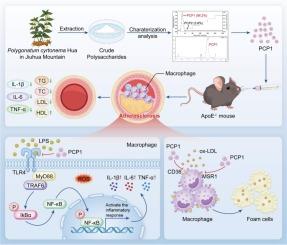Structural polysaccharide PCP1 from Polygonatum cyrtonema Hua attenuates atherosclerosis via dual-target suppression of CD36/MSR1 and TLR4/NF-κB pathways
IF 4.7
2区 医学
Q2 IMMUNOLOGY
引用次数: 0
Abstract
Atherosclerosis, a chronic inflammatory disease, is characterized by lipid accumulation and inflammation in arterial walls. Polygonatum cyrtonema Hua, a traditional Chinese medicine and functional food, has long been used to treat cardiovascular diseases. In this study, we investigated the effects of a purified polysaccharide component (PCP1) from P. cyrtonema Hua on atherosclerosis. In vitro, the influence of PCP1 on lipid accumulation and inflammation in macrophages was assessed. In vivo, ApoE−/− mice fed a high-fat diet (HFD) for 12 weeks were treated with PCP1 via daily gavage. Subsequently, lipid levels, inflammatory markers, and atherosclerotic lesion development were evaluated. The results demonstrated that PCP1 significantly ameliorated atherosclerosis by inhibiting macrophage lipid accumulation and inflammation. Mechanistically, PCP1 downregulated CD36 and MSR1, which are involved in lipid uptake and reduced the expression of pro-inflammatory cytokines by blocking the TLR4/NF-κB signaling. Additionally, PCP1 mitigated the overactivation of aortic endothelial cells and suppressed inflammatory responses in smooth muscle cells. Overall, PCP1 uniquely exerted anti-atherosclerotic effects through dual modulation of lipid metabolism and inflammation, thereby validating its traditional use in cardiovascular conditions and highlighting its potential as a therapeutic agent.

黄精结构多糖PCP1通过双靶点抑制CD36/MSR1和TLR4/NF-κB通路减轻动脉粥样硬化
动脉粥样硬化是一种慢性炎症性疾病,其特征是动脉壁的脂质积累和炎症。黄精是一种传统的中药和功能食品,长期以来被用于治疗心血管疾病。在这项研究中,我们研究了纯化的细胞质花多糖组分(PCP1)对动脉粥样硬化的影响。在体外,我们评估了PCP1对巨噬细胞脂质积累和炎症的影响。在体内,喂食高脂饮食(HFD) 12周的ApoE−/−小鼠通过每日灌胃给予PCP1。随后,评估脂质水平、炎症标志物和动脉粥样硬化病变的发展。结果表明,PCP1通过抑制巨噬细胞脂质积累和炎症显著改善动脉粥样硬化。机制上,PCP1通过阻断TLR4/NF-κB信号通路,下调参与脂质摄取的CD36和MSR1,降低促炎细胞因子的表达。此外,PCP1减轻了主动脉内皮细胞的过度激活,抑制了平滑肌细胞的炎症反应。总的来说,PCP1通过脂质代谢和炎症的双重调节发挥了独特的抗动脉粥样硬化作用,从而验证了其在心血管疾病中的传统用途,并突出了其作为治疗剂的潜力。
本文章由计算机程序翻译,如有差异,请以英文原文为准。
求助全文
约1分钟内获得全文
求助全文
来源期刊
CiteScore
8.40
自引率
3.60%
发文量
935
审稿时长
53 days
期刊介绍:
International Immunopharmacology is the primary vehicle for the publication of original research papers pertinent to the overlapping areas of immunology, pharmacology, cytokine biology, immunotherapy, immunopathology and immunotoxicology. Review articles that encompass these subjects are also welcome.
The subject material appropriate for submission includes:
• Clinical studies employing immunotherapy of any type including the use of: bacterial and chemical agents; thymic hormones, interferon, lymphokines, etc., in transplantation and diseases such as cancer, immunodeficiency, chronic infection and allergic, inflammatory or autoimmune disorders.
• Studies on the mechanisms of action of these agents for specific parameters of immune competence as well as the overall clinical state.
• Pre-clinical animal studies and in vitro studies on mechanisms of action with immunopotentiators, immunomodulators, immunoadjuvants and other pharmacological agents active on cells participating in immune or allergic responses.
• Pharmacological compounds, microbial products and toxicological agents that affect the lymphoid system, and their mechanisms of action.
• Agents that activate genes or modify transcription and translation within the immune response.
• Substances activated, generated, or released through immunologic or related pathways that are pharmacologically active.
• Production, function and regulation of cytokines and their receptors.
• Classical pharmacological studies on the effects of chemokines and bioactive factors released during immunological reactions.

 求助内容:
求助内容: 应助结果提醒方式:
应助结果提醒方式:


